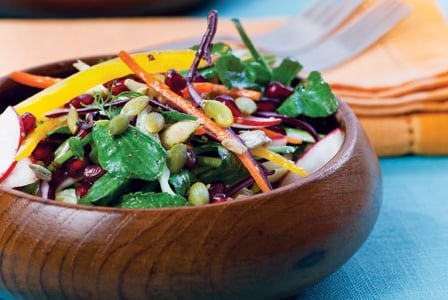
We now know that healthy food is one of our most powerful allies when it comes to dealing with cancer and other diseases
We now know that healthy food is one of our most powerful allies when it comes to dealing with cancer and other diseases. It is also crucial to have a sound mind and spirit, a good attitude, regular exercise, and the support of loved ones.
Take the time to choose your foods wisely and simplify by choosing only fresh, clean foods from their source; avoid packaged foods as much as possible. Take care to lovingly prepare and eat your meals with healthful intentions. Practise this with loved ones as well and, by doing so, you are also contributing to their well-being.
There is no one diet for fighting cancer. Many diets have produced positive results (thank goodness for them), but many people haven’t had that success. And that’s likely because each of our bodies differ. We share much in common but also vary in what we need and how we need to heal.
Achieve nutritional balance
The secret is to find what works for you within a high standard of fresh foods. Fresh, organic, seasonal, and local foods have properties like no other. They contain a beautiful ratio of nutrients that perfectly match the nutrients our bodies need in the environment we live in.
When food is treated with chemicals, picked before ripe, refined, or processed, those delicate ratios are disrupted. Many nutrients are prohibited from even developing or are removed with processing, and therefore no longer act in the same healing synergy. When our body receives the nutrients it needs, a magical thing happens: it’s like putting the golden key into its rightful keyhole and turning it to find a wealth of healing benefits.
A recent breakthrough cancer study suggests that it isn’t the tumour or aberrant cells that are to blame for our illness but the surrounding environment that has provided the imbalance that supports those malignant cells. A change in environment with tools and support provided, and our cells may improve. We just need to make appropriate changes in order to strike the right balance in our daily food, exercise, and stress management options.
Step back in time
Our food has changed drastically since the Industrial Revolution. Previously, all food was organic, since we hadn’t yet introduced synthetic fertilizers or the “cides” (pesticides, herbicides, and fungicides) into the food system. We gradually switched from having virtually all of our food seasonally and locally sourced to not really knowing where much, if any, of it comes from.
Our genes still bear the marks of having developed several hundred thousand years ago when we were hunter-gatherers. That doesn’t necessarily indicate a high animal protein diet either. In fact, many of our ancestors, depending on factors such as climate, season, and region of the world, ate a plentitude of fruits, root veggies, tubers, and seaweeds.
Although it would be helpful to know your ancestry to discover the foods you may be most compatible with, you can also simply start tuning into your body and it will tell you. Just get out of that head and into your body!
Let’s take a step back and return to a diet that is more in line with our individual body’s combined inherent and current needs.
Our recipes incorporate a variety of the cancer-busting foods listed below.
Spice it up
Try these notable cancer-opposing supplements, herbs, and spices.
Supplement your diet with:
omega-3s
fatty fish such as salmon, mackerel, halibut, sardines, anchovies, and herring; walnuts; hemp, flax, and chia seeds
vitamin D
obtain from regular, safe, 20-minute exposure to sunlight, preferably early morning or late afternoon when the UV index is less than 3.
probiotics
fermented foods such as organic yogourt or kefir, miso, natto, kimchi, sauerkraut (without vinegar)j
herbs and spices
turmeric, ginger, rosemary, thyme, oregano, basil, mint, green tea
Veg out
Include a variety of these cancer-fighting fruits and vegetables in your daily diet.
|
Category |
Eat these |
| berries | strawberries, raspberries, blueberries, blackberries, cranberries (fresh or frozen) |
| cruciferous family | broccoli, cauliflower, bok choy, assorted cabbages, kale, collard and mustard greens, arugula, watercress |
| Allium family |
garlic, assorted onions, leeks, shallots, chives, scallions |
| carotenoid-rich veggies |
carrots, yams, sweet potatoes, assorted squash, tomatoes, apricots, beets |
| mushrooms |
shiitake, maitake, cremini, portobello, oyster, reishi |
| seaweeds | nori, kombu, wakame, arame, dulse |
7 tips for living cancer free
- Choose foods wisely: pick organic, local, seasonal, and fresh.
- Eat mindfully, without distraction.
- Have gratitude for what you have in your life and show it.
- Move your body with an activity you love.
- Have a good sleep every night (if you don’t, rest assured a healthier diet and lifestyle will help).
- Nourish and welcome your support system of loved ones.
- Let go of things that are bothering you (past or present). Life is too short to hang onto and allow unresolved issues to cause illness and “dis-ease.” Relax and deep breathe.
Recipes
- Rainbow Coleslaw
- Quinoa-Crusted Salmon
-
Spring Miso Soup

